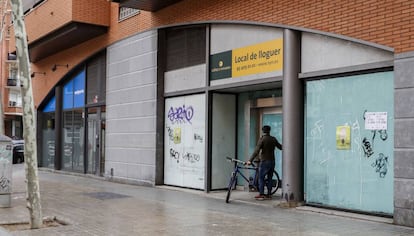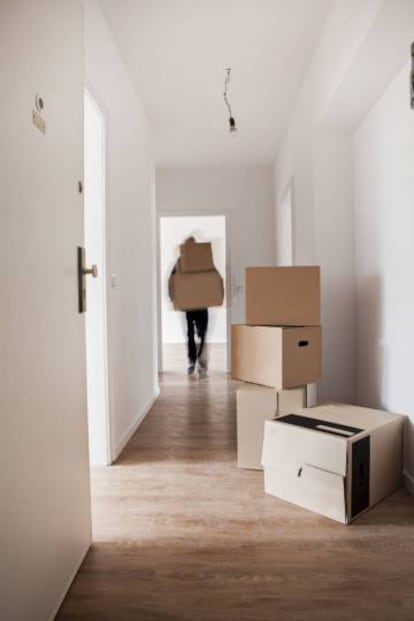Living on commercial property to escape Barcelona’s soaring rent
Some people have resorted to buying or renting business premises even though they lack occupancy licenses

The price of rent in the Barcelona metropolitan area has skyrocketed. In 2017, average rent was €900, and prices rose 10% in just a year. At the same time, a growing concentration of stores in the city’s main shopping areas, coupled with the rise of online sales, has left 30,000 commercial premises lying empty across Catalonia.
Some families have done the math and found a quick fix for their living needs: they are buying, renting and occupying business spaces even though these lack residential occupancy licenses.
Right now there is no apartment in Barcelona with a halfway affordable price for a working family
Cristina, commercial property resident
There are between 8,000 and 10,000 empty commercial properties in the city of Barcelona, according to the realtor Amat, although city officials reduce that figure to 6,000.
Faced with this reality, real estate agencies have begun pressuring authorities to allow rezoning of properties. At a recent talk during a Barcelona event called Retail Week, industry leaders – including Amat – said that around 10,000 empty commercial properties could be rezoned and used as subsidized housing for population segments most at risk from soaring rental prices, chiefly the young and the elderly.
“The City does not oppose turning former commercial space into housing, as long as they have occupancy licenses and it does not affect retail trade,” said Barcelona city sources.

In July, the grassroots group called Plataforma de Afectados por las Hipotecas (PAH), which provides support for mortgage holders in distress, occupied seven residential homes in a building located on 477, Aragó street. These properties were then handed over to several families who had been evicted from other parts of Barcelona.
Antonio is one of them. He and his son had just been thrown out of a retail space that they had been living in without an occupancy license. Antonio resorted to PAH – one of whose co-founders was Ada Colau, now the city mayor – and he was placed in one of the apartments on Aragó street, which are owned by an investment fund that is working to have them evicted.
“It’s not the most common thing, but we do have cases of people living inside retail premises and office space, places with no occupancy license,” said Lucía Delgado, a PAH representative.
Cristina, who is using an assumed name, decided to purchase a commercial space and turn it into a residential unit. For the last six months she has been living inside a property in the Sant Martí district, and she would rather remain low key in case her situation causes problems with local authorities or, “above all,” with the neighbors.
“My rental contract was ending and right now there is no apartment in Barcelona with a halfway affordable price for a working family,” she said.
The City does not oppose turning former commercial space into housing, as long as they have occupancy licenses and do not affect retail trade
Barcelona City spokesperson
With rent starting at €1,000, she even considered leaving the city. But prices in the metro area were still sky high. Then, one day, she happened to see ads for affordable apartments for sale in the city. The only drawback: “They had no occupancy licenses.”
Cristina, who lives on the property with her husband and daughter, decided to buy it because she found that merely renting such a space made everything really hard: “It’s harder to register on the municipal census, plus the owner cannot rent it out as housing, which makes it harder to prove that you have the right to send your kids to the neighborhood school or use the local health center.”
The last official count shows that Barcelona has 78,033 commercial properties, of which 77.2% are operational. The city figures that 3,106 of the empty premises are being used as living quarters despite having no occupancy licenses. Some are used as homes, others as garages, and some for other residential purposes. The neighborhoods with the most empty premises are located to the left and right of the city map.
English version by Susana Urra.
Tu suscripción se está usando en otro dispositivo
¿Quieres añadir otro usuario a tu suscripción?
Si continúas leyendo en este dispositivo, no se podrá leer en el otro.
FlechaTu suscripción se está usando en otro dispositivo y solo puedes acceder a EL PAÍS desde un dispositivo a la vez.
Si quieres compartir tu cuenta, cambia tu suscripción a la modalidad Premium, así podrás añadir otro usuario. Cada uno accederá con su propia cuenta de email, lo que os permitirá personalizar vuestra experiencia en EL PAÍS.
¿Tienes una suscripción de empresa? Accede aquí para contratar más cuentas.
En el caso de no saber quién está usando tu cuenta, te recomendamos cambiar tu contraseña aquí.
Si decides continuar compartiendo tu cuenta, este mensaje se mostrará en tu dispositivo y en el de la otra persona que está usando tu cuenta de forma indefinida, afectando a tu experiencia de lectura. Puedes consultar aquí los términos y condiciones de la suscripción digital.








































